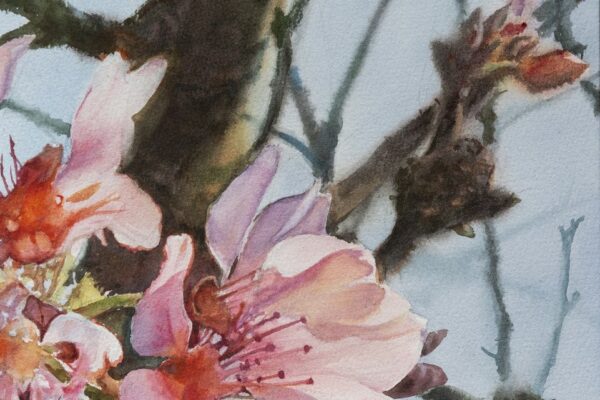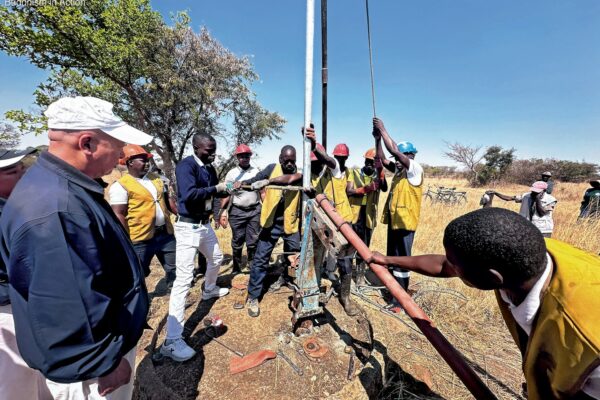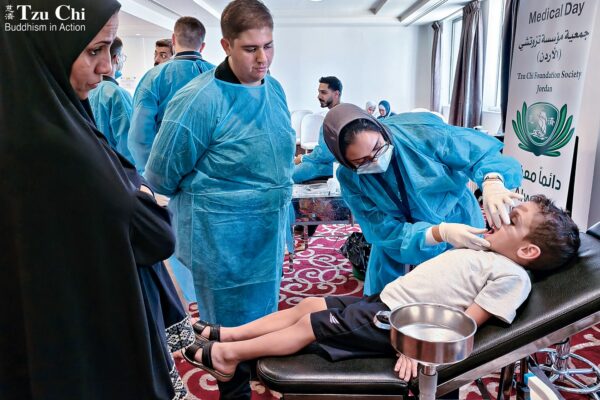By Shu Min Park
Translated by Wu Hsiao-ting
Panic and distrust are sometimes worse enemies than the virus itself during a disease outbreak. When you become a victim of discrimination, you appreciate even more the values of respect and love.
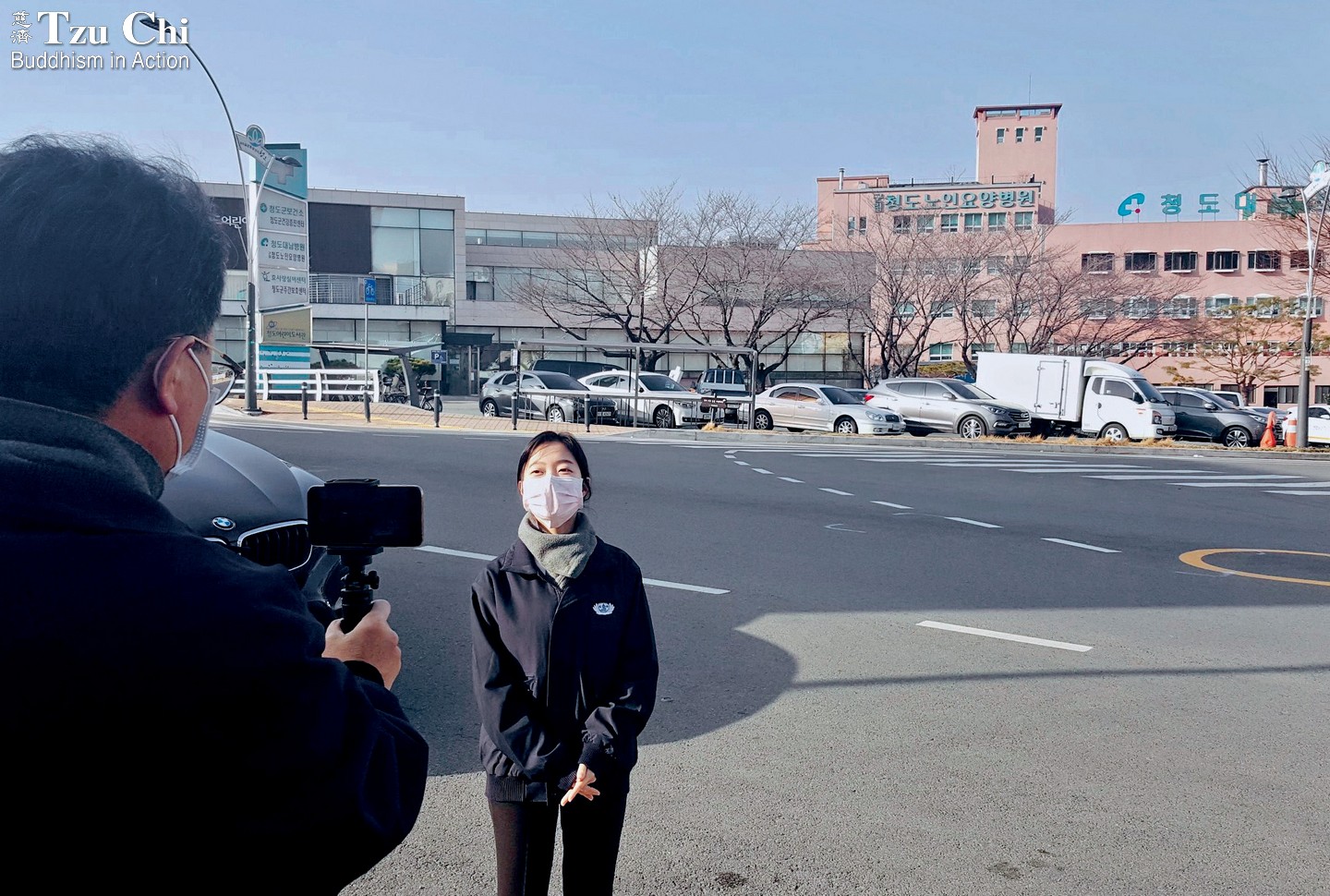
Shu Min Park, the author of this article, reports on the coronavirus situation in South Korea on February 22 while her father, Dong Seob Park, videotapes her. In the background is Cheongdo County’s Daenam Hospital, where a mass outbreak of COVID-19 had occurred. SHU LING YEN
COVID-19 has spread around the world like wildfire, but South Korea was one of the hardest hit countries early in the pandemic. It seemed like all the eyes of the world were focused on the country during that time.
I’m from South Korea and am now, like my older sister, studying in Taiwan. My father, Dong Seob Park, is from South Korea, and my mother, Shu Ling Yen (嚴淑齡), is from Taiwan. Both are Tzu Chi volunteers in South Korea. Following in my parents’ footsteps, my sister and I also became Tzu Chi volunteers. We received our volunteer certifications in October 2019.
In late January this year, my parents came to Taiwan to celebrate Chinese New Year at the Jing Si Abode, the Buddhist convent founded by Dharma Master Cheng Yen. By then, I’d heard that a contagious disease was spreading in Wuhan, China. I had noticed that there was a decrease in the number of visitors at the Abode, and that many were wearing face masks. There were even temperature checks at the entrance for visitors. I didn’t think much about it at the time—I thought people were just being cautious. Only later, after we had left the Abode and learned from the news that Wuhan had been put on a lockdown, did I realize how grave the situation had become.
Back in 2003, when the SARS epidemic broke out in China, my mother, sister, and I were living in Qingdao, Shandong Province, eastern China. Because we were foreign nationals, we had applied for and installed a satellite dish, and thus were able to watch TV programs from South Korea and other countries. And although the Internet at that time wasn’t as prevalent as it is today, we could also go online. When Mom learned from the TV and Internet about the spread of an unidentified virus in southern China, she immediately requested leaves of absence for my sister and me from the school we were attending. She decided that my sister and I should stop going to school to be on the safe side.
It wasn’t long before SARS began quickly spreading in China. As a result, my dad couldn’t come to join us in Qingdao. Mom, my sister, and I were homebound for as long as six months.
That was an unforgettable period in my memory. I was a first grader back then, and it felt great not having to go to school. I spent a lot of happy time with Mom. After I had grown up, I’d sometimes hear Mom talking about that period. She said that in order to stay safe from the epidemic, she left home only once a week to go shopping. Except for that, she never ventured out of our home.
Each of her trips to the supermarket was carefully planned down to the last detail. First, she’d make a list of things she wanted to buy. Next, she would plan a route through the supermarket that would allow her to complete her shopping as quickly as possible. She wanted to reduce her chance of exposure by shopping as efficiently as she could. Then she’d put on a hat, a face mask, and gloves—literally covering herself from head to toe—before rushing into the supermarket, snatching up the items on her list as she ran from one aisle to the next, then dashing to the counter to pay for her purchases. With her planning and preparation, she could make it in and out of the supermarket in no time.
Mom said that those six months were difficult for her. It was not easy taking care of two kids in a foreign country by herself, let alone having to live with the additional threat of the invisible yet severe epidemic looming over us. She often felt helpless and fearful, and the self-imposed isolation left her physically and emotionally exhausted. However, she also said the experience taught her the importance of staying alert and vigilant at all times. Constant vigilance and awareness of risks helps one stay safe and sound, and nothing is more of a blessing than being safe and sound.
Who was to know that 17 years later another unknown virus would appear, with no cure or vaccine in sight? When Mom saw the news of the coronavirus, she said, “Things aren’t looking good. We need to begin taking precautions, and more importantly, get mentally prepared.”
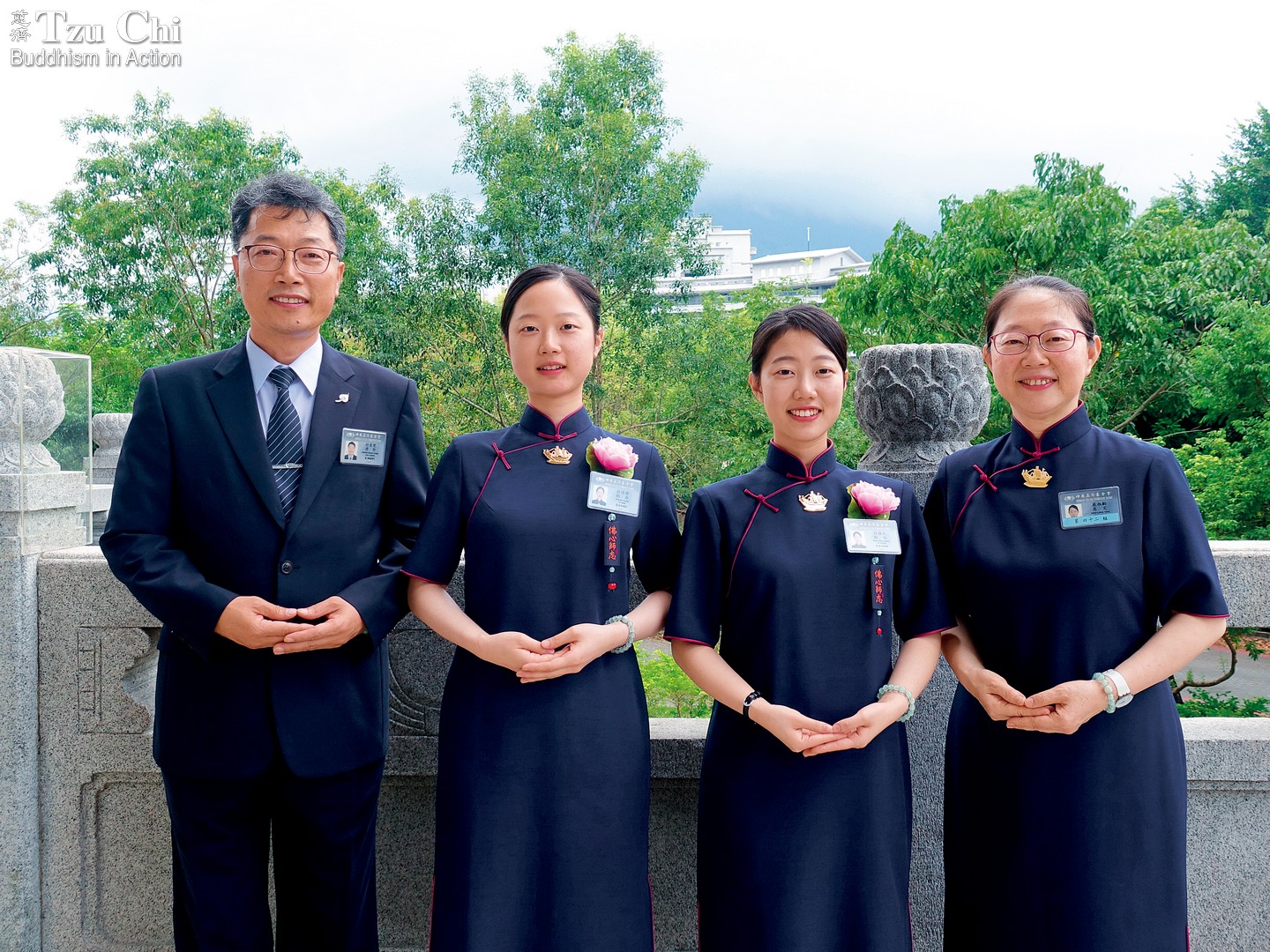
Accompanied by their parents, Shu Min Park (second from right) and her older sister, Po Lin Park (second from left), received their volunteer certifications from Master Cheng Yen in Hualien, eastern Taiwan, on October 26, 2019. CHEN YI-QIAN
The eruption
When we arrived back in South Korea from Taiwan on February 1, there were just a few confirmed cases of COVID-19 in the country. At Incheon Airport, Chinese passengers had to undergo screening in a dedicated area, while non-Chinese travelers could proceed directly through customs if they didn’t have a fever. The Chinese people in the screening area all wore tense expressions, and people passing by, including me, couldn’t help but look at them. Never in our wildest dreams did we imagine that the situation would be reversed just a few weeks later.
My family and I predicted early on that the epidemic would get much worse, so aside from Dad, who had to go out to work, we all stayed home as much as we could. During this period, we visited our grandma once. Our Korean relatives thought we were making a mountain out of a molehill when they saw us wearing face masks and immediately washing our hands as soon as we entered the house. They told us not to be so nervous, that though confirmed cases were appearing in South Korea, the media had said that the disease had a high rate of recovery. Most Koreans, like our relatives, didn’t yet have a sense of crisis at the time. Almost no one on the streets was wearing a mask.
The 31st confirmed coronavirus case appeared in South Korea on February 18. Just two days later, on the 20th, the total number of confirmed cases had spiked to 82. After that, it was like the fabled Pandora’s Box had been opened—the situation rapidly spun out of control. Mayor Kwon Young-jin of Daegu, a southern city that was hit hard, had no choice but to publicly ask for help. He expressed concerns that the mounting infections in the city would soon overwhelm the local health infrastructure. He called for urgent assistance from the central government.
The 31st patient of the coronavirus was a member of the Shincheonji Church of Jesus, based in Daegu. The patient sought treatment several times after showing symptoms of a fever, but refused to be tested for COVID-19. She even attended several gatherings of church members during this time. By the time she eventually tested positive, more than a hundred people had come into contact with her. This regretful situation was further compounded when some members of the same church refused to comply with the government’s anti-coronavirus measures. Because the efforts to contain the outbreak were thus hampered, the disease quickly spread in many southern communities.
Finding ways to give
I was eating breakfast early on the morning of February 22 when news broke about the explosion of confirmed coronavirus cases in Daegu and surrounding North Gyeongsang Province. The total number of infected persons at that time was 346.
Seeing how severe the situation had become, Mom and Dad felt that as Tzu Chi volunteers, we had to go check things out. Mom saw the worried, questioning look on my face, and knew I was concerned about visiting affected areas. She comforted me by saying: “We won’t come in physical contact with others, and we won’t go into a hospital. We’ll take all necessary precautions. We’re just going there to look and collect information to send back to Tzu Chi. We need to find out if there is anything we can do to help. Let’s keep our thoughts positive.”
I instantly felt ashamed of myself. I had become a certified Tzu Chi volunteer just last year, and yet when things happened, all I thought of was my own fear and safety. On the other hand, Mom and Dad focused on how they could help others in such a crisis. I really have a lot to learn from them.
Our nerves were taut as we took every possible precaution during our trip. We kept our masks on all through our visit to the regions hit by the epidemic. We washed our hands as often as we could and thoroughly sanitized our hands with alcohol every time we returned to our car to visit another area. We even avoided eating in the affected regions to prevent infection.
We arrived at Daenam Hospital in Cheongdo County, North Gyeongsang Province, after a four-hour car ride. A mass outbreak of COVID-19 had occurred at the hospital. Though the public had been forbidden to get close to it, we found a spot where we could videotape the exterior of the hospital from a distance. Dad served as the cameraman, Mom recorded the situation in writing, and I reported in front of the camera. As soon as we finished our documenting work, we hopped back into the car and moved on to the next destination.
Later that day, we added the latest coronavirus updates from the government to the information we had collected and transmitted it all back to Tzu Chi’s Da Ai TV. We made the most of every second during our trip and did what we were there to do. Our trip had been a good and enriching one.
The number of infected cases in South Korea continued to rise sharply, and the prices of medical supplies and protective gear spiked along with it. The media began to criticize the authorities for missing the golden window to avert the epidemic. People started to panic. Long lines began to form in front of shops that sold face masks and other protective gear.
Despite that, the crisis this time allowed me to witness once again the strong cohesion and solidarity among South Koreans as a nation. Every time a major disaster strikes, people in my country put their support behind the government and work together to pull our country through the challenge. Everyone donates generously to help out, from big enterprises to small businesses, from celebrities to ordinary folks. During the COVID-19 outbreak, the same spirit of cohesion and solidarity was again clearly evident.
Medical care workers, for example, have made laudable efforts. Many healthcare professionals volunteered to serve in the areas hit hard by the epidemic. Some even brought their own medical supplies and equipment with them to avoid using the precious medical resources in the affected areas. The government also offered enticing benefits to medical workers to encourage more people to join in the fight against the coronavirus.
The South Korean government has, through legislation, introduced many policies and measures to fight the disease. They are sparing no efforts to help our country overcome the outbreak. Though things are still difficult there, I believe that with everyone’s combined efforts, South Korea will pull through again.
Warm care
One time, I unwittingly spoke Chinese when I was still back home in South Korea. As soon as the words had left my mouth, I received very unfriendly looks from people around me. My cousin Jin Gyu Baek experienced something similar. He was the first Korean to have graduated from the Department of Communication Studies at Tzu Chi University in Taiwan. Once he happened to be talking to a Taiwanese friend on the phone when he was dining in a restaurant in South Korea in the early days of the outbreak. When the woman sitting at the table next to my cousin’s heard him speaking Chinese, she immediately rose from the table, grabbed her child by the hand, and left the restaurant.
In South Korea, we were afraid to speak Chinese when we were out and about. But when my sister and I returned to Taiwan to resume our studies after the winter break, the situation was reversed due to the escalating coronavirus situation in South Korea. We had to remember not to speak Korean. The epidemic has really taught me a lot, especially the importance of respect for others. I deeply regret having given unfriendly looks to the Chinese travelers at Incheon Airport back in South Korea.
Panic and distrust are sometimes worse enemies than the virus itself during a disease outbreak. When I became a victim of discrimination, I thought of how Master Cheng Yen had taught us to harbor “gratitude, respect, and love” for others. I also came to a deeper realization of the value of the Buddha’s teachings about how all lives are equal. These teachings of the Buddha and Master Cheng Yen have great significance—when one is discriminated against because of one’s race, nationality, skin color, or other factors, the psychological trauma inflicted can be tremendous.
Many things aren’t as simple as we think. Chinese people themselves don’t want to get the virus—they are victims too. Some foreigners think that all Chinese people eat bats and that’s why they got the virus, but that thinking is misguided. Are all South Koreans members of the Shincheonji Church of Jesus? Of course not!
One day my sister visited a shop in Taiwan after she had returned from South Korea. Hearing her accent, the shop owner asked her where she was from. My sister told me afterwards that that was the first time in her life she had ever felt nervous and insecure because she was South Korean.
Despite her apprehension, my sister honestly told the shop owner that she was a South Korean. Much to her surprise, the shop owner said to her, “Do you miss your family then? With what is now happening in South Korea, you probably won’t be able to return home anytime soon.” My sister was deeply touched at that moment. She had thought that she would probably be discriminated against again or receive another look of panic or fear, but instead, the shop owner had shown care and concern for her. Those kind words from the shop owner moved my sister in a profound way. When she told me of the exchange, I was moved too. We felt once again Taiwanese people’s friendliness and love.
The epidemic has driven home to me the real meaning of respect. When others are in distress, we can’t demonstrate true respect for them unless we put ourselves in their shoes and look at things from their perspective.
While the coronavirus outbreak has naturally led us to fear for ourselves, this might also be a good time for us to think of the rights of animals to live. In the same way we fear losing our lives to the coronavirus, animals fear losing theirs too when they are taken to a slaughterhouse to be killed. All lives are equal. Animals are as deserving of respect and empathy for their rights to live as are human beings.
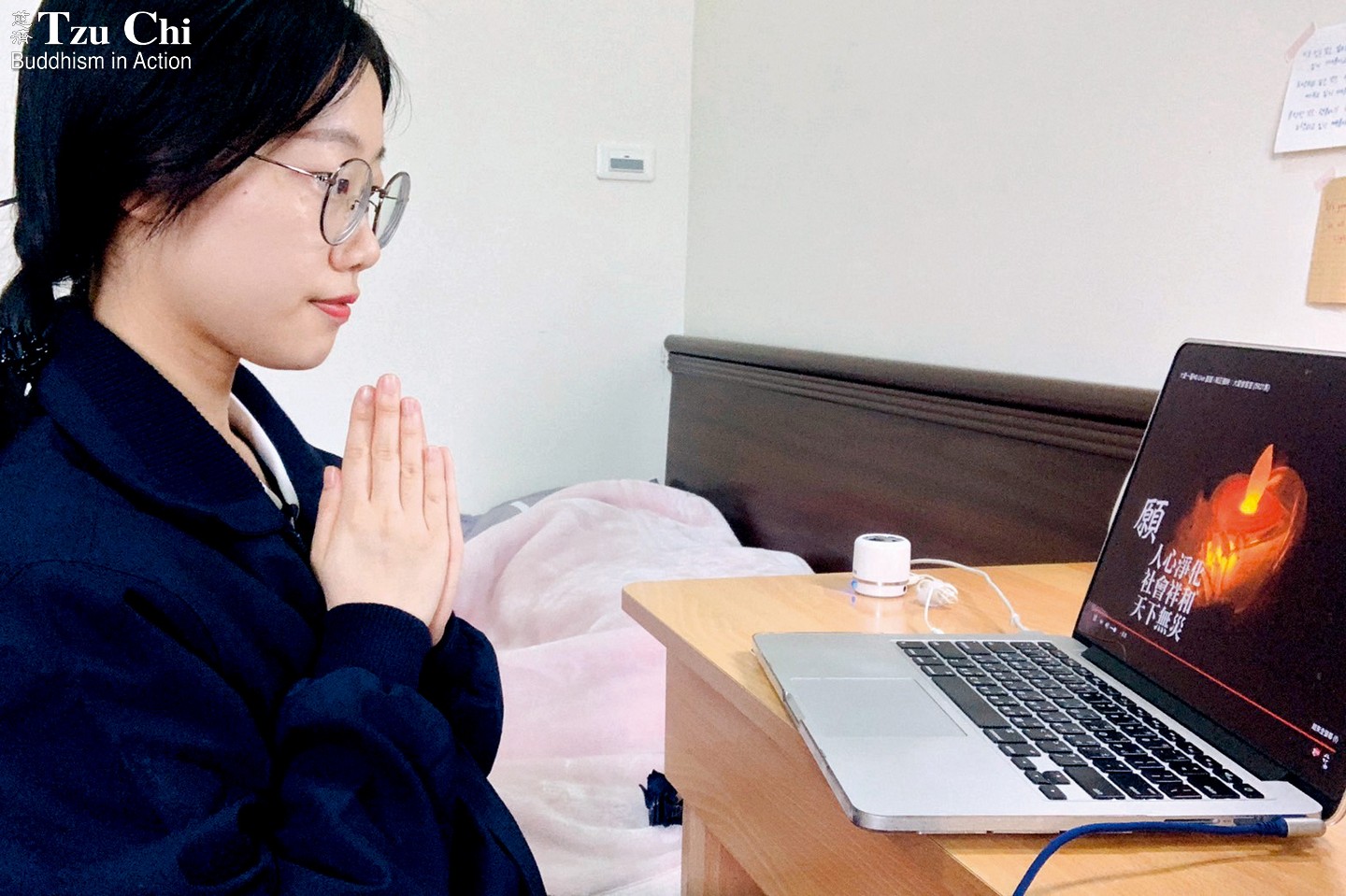
Shu Min Park participates in a prayer event laun-ched by Tzu Chi after the outbreak. COURTESY OF SHU MIN PARK
Protecting others by staying home
I returned to Taiwan on February 23 to continue my graduate studies at Tzu Chi University. At that time, people entering Taiwan from South Korea were not yet required to observe 14 days of home quarantine. All I needed to do was conduct a 14-day period of self-health management, meaning that I could still go out as long as I wore a surgical mask. Even so, I stocked up on food and stayed home as much as I could. In a time like this, staying home is the best way to protect ourselves and others.
Even at home, I could do many things I needed to do. One of my daily routines was participating in a prayer event launched by Tzu Chi. Every afternoon at 1:30, I got online and prayed with other Tzu Chi volunteers for blessings for the world. My parents and sister took part in the event too. Though we were in different places, my parents in South Korea and my sister and I in different places in Taiwan, we could still pray together via the event.
Three weeks after my sister and I had returned to Taiwan, the number of confirmed coronavirus cases in South Korea exceeded 8,000. After that, the disease continued to sweep across countries around the world, causing much alarm and panic. Let’s all take due precautions to protect ourselves and others in this global pandemic, eat vegetarian to show our respect for all lives, and pray piously to amass goodwill. May the outbreak come to an end soon and our world be free from all future disasters.

